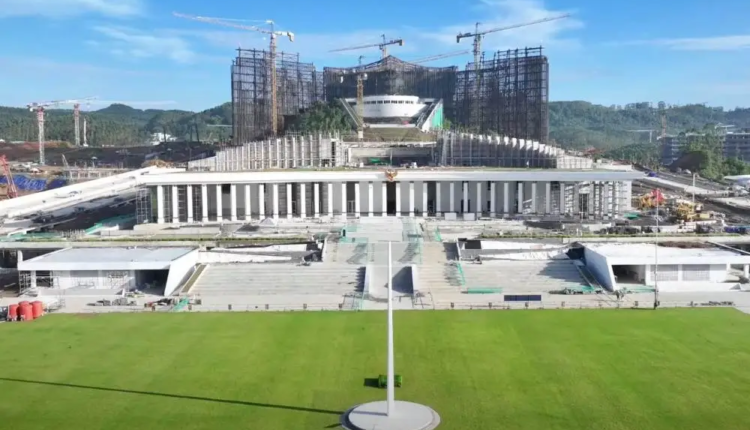President Jokowi Encourages Economic Inclusion in IKN to Improve Public Welfare
By: Rivka Mayangsari)*
The development of the Indonesian Capital City (IKN) initiated by President Joko Widodo (Jokowi) is not only intended as an infrastructure project, but also a major effort to improve public welfare and create economic inclusion. President Jokowi emphasized that this development must have a positive impact on the wider community, especially in East Kalimantan, where the IKN is being built. This effort is in line with Indonesia’s vision to achieve sustainable development that is fair and equitable.
The development of the IKN is expected to not only present a new capital city, but also become a significant center of economic growth for the surrounding community. With various programs that include improving education, health, and employment, the IKN is projected to become a new economic magnet that can empower local and regional communities. Economic inclusion is seen as one of the important keys to achieving this goal.
Assistant Deputy for Poverty Alleviation of the Coordinating Ministry for Human Development and Culture (Kemenko PMK), Katiman, said that the development of the IKN is not only focused on the core area of the capital city, but must also pay attention to integration with surrounding areas such as Kutai Kartanegara Regency, Penajam Paser Utara, Samarinda, and Balikpapan. This cross-regional collaboration is expected to create synergy in development that is not only focused on infrastructure, but also includes improving the quality of life of the community through access to education, health, and employment.
Cross-regional collaboration in the development of the IKN is very important to ensure that development is not only concentrated in one point, but also has a positive impact on the wider area. Increasing access to health and education facilities and providing employment opportunities is expected to create equitable prosperity. This synergy is expected to support sustainable economic development in the Nusantara region, including the development of the agricultural, trade, and tourism sectors that can drive the local economy.
Director of Basic Services of the Indonesian Capital Authority (OIKN), Suwito, said that the development of the IKN cannot be separated from the development of educational and health facilities and infrastructure. This is considered an important step to create human resources (HR) that are able to compete in the era of globalization. He explained that sustainable development requires improving the quality of education and health in the Nusantara region to create HR that is able to compete in the six economic clusters (superhubs) planned in the IKN.
The IKN is designed as a center of economic growth with six main economic clusters covering technology, renewable energy, manufacturing, agriculture, logistics, and tourism. To support this vision, increasing the capacity of human resources in these sectors is very important. The government hopes that with adequate education and training facilities, local communities will be able to actively participate in these industries and become part of the progress that occurs in the IKN.
In addition, improving the quality of health facilities is also very important in human resource development. Good health facilities will ensure that the community can receive optimal health services, so that they can be more productive and contribute to the local economy. By improving the quality of education and health, the community around the IKN is expected to be able to become quality and competitive human resources in the global job market.
OIKN Community Empowerment Director, Conrita Ermanto, explained that empowering local communities is one of the main focuses in the development of the IKN. She emphasized the importance of active involvement of local communities in every stage of development, so that the community is not only a spectator, but also an important actor who is directly involved in the development process. Sustainable development design is expected to enable active community participation in every stage of IKN development.
Conrita added that local communities must be empowered through involvement in various sectors, such as construction, trade, and natural resource management. This empowerment is expected to not only increase community income, but also create sustainable economic independence. Thus, communities around the IKN can grow along with the progress of development and feel the benefits in the long term.
Empowering local communities also includes skills training and mentoring programs in entrepreneurship, which aim to create more jobs at the local level. This program is designed so that communities not only enjoy the results of development in the short term, but also have better prospects in the long term.
The development of the IKN is part of the government’s major commitment to improving the welfare of people throughout Indonesia, especially in East Kalimantan. President Jokowi continues to emphasize that the development of the IKN must bring benefits to all levels of society, not just to a handful of elites or large corporations. Economic inclusion that involves the entire community is a basic principle in every stage of the IKN development.
By involving infrastructure improvement, human resource development, and empowerment of local communities, the development of the IKN is expected to be a strong driving force for the economy in Indonesia. Collaboration across regions and sectors is also expected to be the key to creating sustainable prosperity. Inclusive and sustainable development in the IKN will not only change the face of Indonesia physically, but also bring significant positive impacts to the welfare of people throughout Indonesia.
)* Public policy observer
